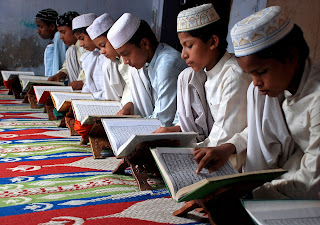Muslims have a tradition that when facing options in which there is no clarity, to make the above supplication. As a ritual, the basic procedure is to offer a two-unit (rak'ahs) prayer and make the above supplication.
A full examination of the Istikhaarah rite
The tradition is based on the following report " On the authority of Jaabir b.'Abdullah, Radee Allahu 'anhu: The Prophet (Muhammad) Sall Allahu 'alayhi wa sallam would instruct us to pray for guidance in all of our concerns, just as he would teach us a chapter of the Qur'an! He, Sall Allahu 'alayhi wa sallam, would say "if any of you intends to undertake a matter, let him pray two -units of voluntary prayer, and afterwards supplicate (the istikhaarah supplication)."
There are some interesting elements of the practice that are present in the above hadeeth, which are addressed below
Pray for guidance in all concerns.
The Muslims are instructed to offer five daily prayers, give in charity, and fast as necessary elements in our attempts to be close to the Creator. The rite of offering two- unit salaah, in which Soorah Al-Faatihah (Ft.1) is recited, as well as the other normative worship texts (Tasbeeh, Tahmeed, Tashahhud, Salaat 'alan nabi etc) shows us that there is to be an attitude of submission, and acceptance to the Divine plan! We don't always know what that plan is, but we are expected to integrate ourselves to it.
The Qur'anic revelation states: " So, where will you go? It (Qur'an itself) is none except a reminder to all nations, for whosoever amongst you that wants to go straight, and you are not to will, except as Allah has willed, (he is) the caretaker of the universe." (Q 81:26-29)
This supplication (du'aa) was taught just as the Qur'an was taught
This is very telling. The Prophet Muhammad, upon whom be peace and blessings, made the teaching of this supplication a priority, in the same fashion that Quranic education was a priority! The Qur'an itself teaches that God hears all supplications (Q 2:186), while also asserting that He knows the contents of one's heart (Q 3:154, 5:7, 8:43, 67:13-14 and many other texts).
So, what is the purpose of reciting a specific supplication? Why recite a supplication at all, if God already knows what we are in need of in the first place?
The answer is that the Istikhaarah supplication is done, primarily, as an act of worship (ta'abudi), and worship itself has a way of addressing one's concerns by its very nature. A person develops a closer tie to the Almighty through worship and supplication, the stronger that tie is, the weaker the particular problem will be, until that problem gets resolved.
Translation of the supplication
O Allah, I seek your guidance by your knowledge. strength by your power, I ask from your magnificent bounty, you have power, while I don't have power. You know, and I do not know, and you are the full knower of the hidden ('allaamal Ghuyoob).
O Allah, if you know this issue (and mention the issue) to be best for me in my faith (deeni), my life (ma'aashi), my ending ('aaqibati amri), then decree it for me, make it easy for me, then bless me in it.
And if you know this issue (haadhal Amr) is harmful for me (sharrun li) in my faith, life and ending, then remove it from me and me from it, decree for me what is best (khayr) wherever it is and make me satisfied with it."
The supplication teaches bullet points of priorities
The supplication texts of both the Qur'an and Prophetic tradition serve as more than ritualized recitations, rather, they serve as items conveying lessons. In this case, after telling us repeatedly about the Divine power and knowledge, this du'aa teaches that what we are to look for, when trying to make a decision that has long term consequences, is if that issue for which we are indecisive, if it will be the vehicle for religious/spiritual growth, enhance one's worldly life/happiness, and be a source of peace when the end of life comes.
What happens after Istikhaarah?
This can be followed up with seeking advice on the matter from trusted sources, as well as writing out a list of pros and cons on the matter. Ultimately, the supplicant has to live with their choices, but the supplication gives us core things to look for. Many people limit the Istikhaarah supplication to marriage, however it can be offered when facing other choices as well, such as career, moving, business, etc.
Many depend on "a good feeling", intuitive understanding, afterwards, or seeking out a dream or a miracle as a sign from God in favor or against. While we cannot say for certain what Allah will do, we can be assured that the supplication helps us to make the decision on our own.
After all, God has given us minds, hearts, arms and legs by which to make decisions and to be able to make those decisions come into reality.
Footnotes
(1) Soorah Al-Faatihah, the opening chapter of the Qur'an, is the necessary text for every unit of prayer. There is consensus (Ijmaa') on this. It is a text of both worship and supplication.


3 comments:
This really helped me to get a fuller more personal view of istikhara prayer. Thank you.
@ Zaimah Habeeb.
Certainly.
Very beautiful
Post a Comment